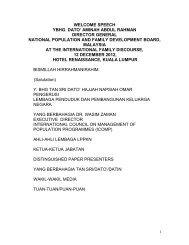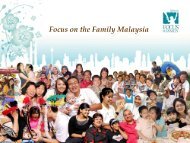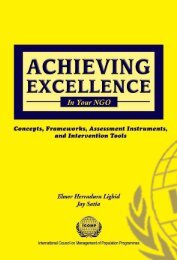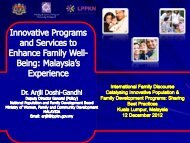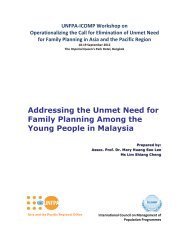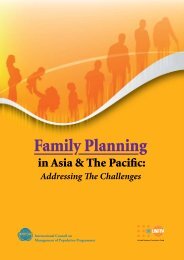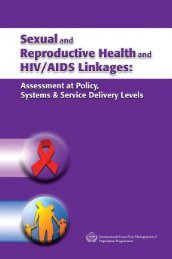national reproductive health strategy - Ministry of Public Health ...
national reproductive health strategy - Ministry of Public Health ...
national reproductive health strategy - Ministry of Public Health ...
Create successful ePaper yourself
Turn your PDF publications into a flip-book with our unique Google optimized e-Paper software.
National Reproductive <strong>Health</strong> Strategy (2012–2016)Yet another important capacity-building need is that <strong>of</strong> the RHD itself. The September 2010 RHDCapacity Assessment Report indicated numerous areas that urgently require strengthening in orderfor the Directorate to fulfill its mission. Two particular areas <strong>of</strong> concern were: The capacity <strong>of</strong> the Directorate’s senior management to effectively plan, coordinate andcommunicate the <strong>national</strong> RH programme needs to be strengthened and supported, andThe need for systematic, operational or human resources support in order for the RHD t<strong>of</strong>unction in an effective way as the stewards and technical experts for RH <strong>national</strong>ly.The RHD will actively seek the reinforcement that it needs in these areas in several ways. It willendeavour to increase its resources, both from governmental and nongovernmental sources. It willalso work on strengthening the skills <strong>of</strong> its own staff so that they will be better equipped to carry outtheir responsibilities. In addition, it will encourage its partner agencies to participate in this capacitybuildingobjective.Resources RequiredAs has been the case in the past, funding sources for the RH <strong>strategy</strong> will be many and varied. Thefunding for the human resources, infrastructure, equipment, supplies, transport and support neededto achieve the <strong>strategy</strong>’s interventions will be determined. Government’s costs will be identified. Theresources needed and those available to implement the <strong>strategy</strong> in different parts <strong>of</strong> the country willvary, but the RHD will collaborate with PHOs to ensure that <strong>reproductive</strong> <strong>health</strong> is adequatelyrepresented in provincial <strong>health</strong> plans and budgets. The MoPH will proactively disseminate the<strong>strategy</strong> to PPHDs and BPHS/EPHS-implementing NGO partners, and determine the implications forthe strategic plan in each province through a series <strong>of</strong> regional or provincial workshops.Individual activities <strong>of</strong> each intervention will be planned and costs and sources <strong>of</strong> funds for eachactivity will be determined. In many instances, multiple sources will be tapped for a singleintervention.Human Resources and DevelopmentThe emphasis on training <strong>of</strong> community midwives will continue, and in general, graduates will bedeployed in or near their home area. Working with relevant ministries, the RHD will explore ways toimprove CHWs’ and facility-based <strong>health</strong> workers’ counselling skills and skills in working withcommunity groups. As CHW roles in the community become more extensive, the RHD will also seekpartners to train CHSs in the content <strong>of</strong> the CHWs’ community-based interventions as well as inmethods <strong>of</strong> supportive supervision.National and provincial trainers have already been trained in the knowledge, skills and standardscontained in the <strong>national</strong> adaptations <strong>of</strong> the WHO manuals Managing Complications in Pregnancyand Childbirth and Managing Newborn Problems. The RHD will now work with the <strong>Ministry</strong> <strong>of</strong> HigherEducation to incorporate these skills and standards into the pre-service training <strong>of</strong> university-level<strong>health</strong> care providers, particularly general physicians, ob/gyns and paediatricians, as appropriate.Page 36



